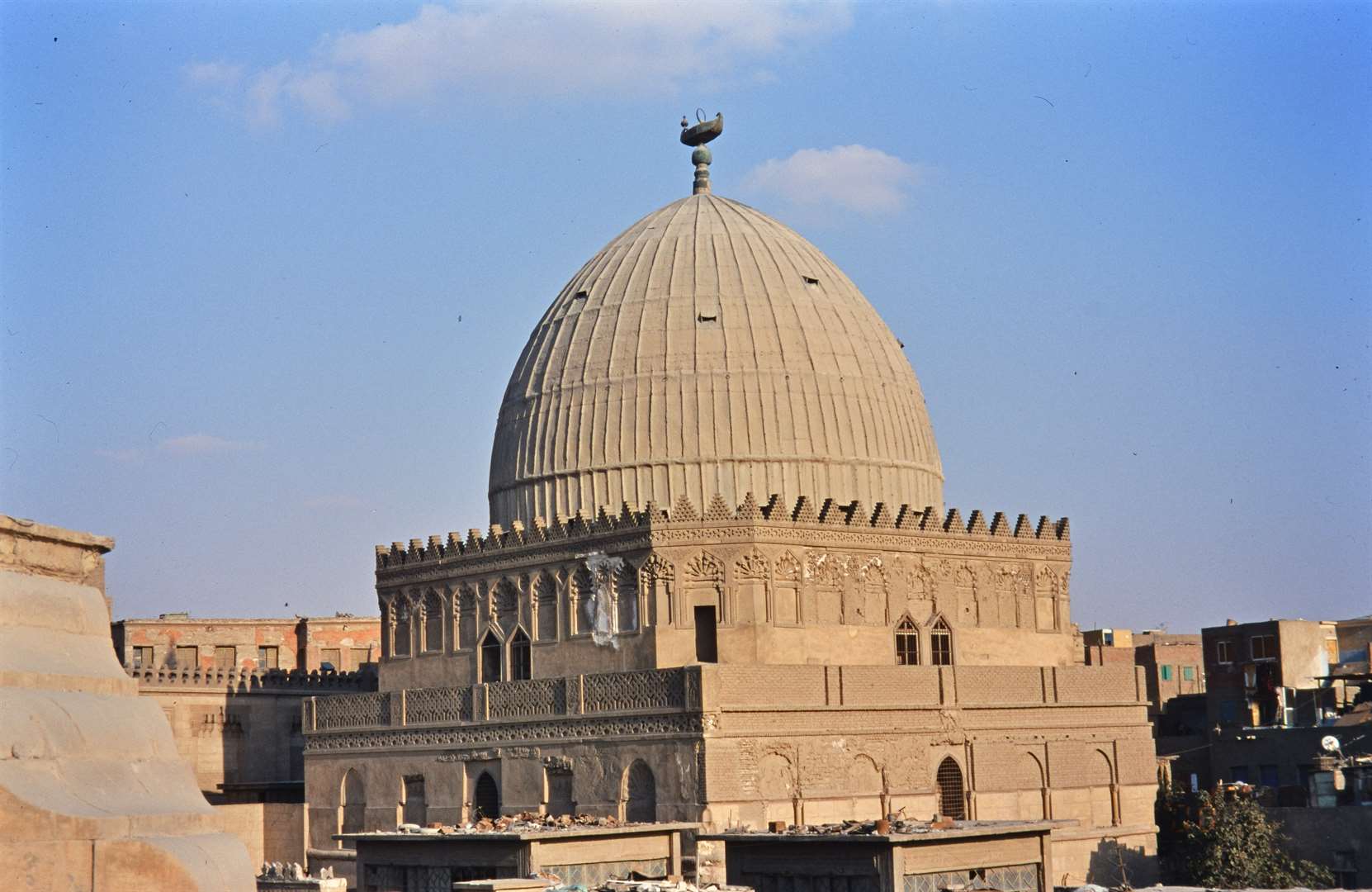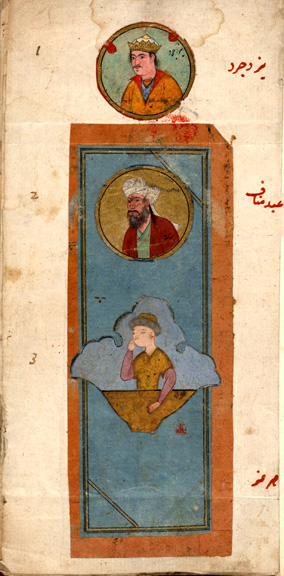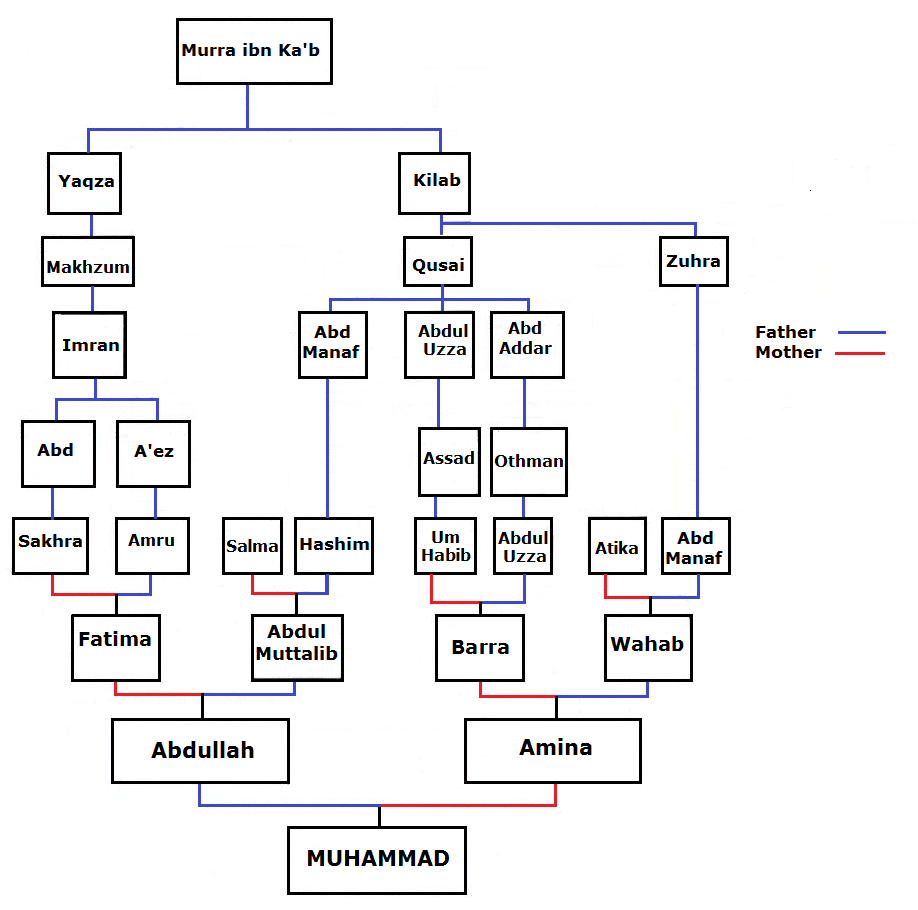|
Muttalib Ibn Abd Manaf
Al-Muttalib ibn Abd al-Manaf ( ar, ٱلْـمُطَّلِب ٱبْن عَبْد مَنَاف, ''al-Muṭṭalib ibn Abd al-Manāf'') was the grandfather of Ubaydah ibn al-Harith, a sahabi of Muhammad. He was also the ancestor of Imam Shafi. History His father was Abd Manaf ibn Qusai. Al-Muttalib was the younger brother of Hashim ibn Abd Manaf (the great-grandfather of Muhammad). He succeeded his brother Hashim and took care of his nephew Shaiba ibn Hashim; when he returned to Mecca with his nephew people thought he was his new slave, so Shaiba became known as "Abd al-Muttalib" (servant of al-Muttalib) because slavery was so common and rampant at that time. When al-Muttalib died, his sons and nephew Abd al-Muttalib succeeded him. He is the progenitor of Banu al-Muttalib through his children: Al-Harith (or Al-Arrat; father of Ubaydah, al-Tufayl, and al-Husayn), Ayyilah (who married Uhayb, brother of Wahb ibn Abd Manaf), Hashim (ancestor of Imam Shafi), Makhramah (father of Qays, ... [...More Info...] [...Related Items...] OR: [Wikipedia] [Google] [Baidu] |
Ubaydah Ibn Al-Harith
ʿUbayda ibn al-Ḥārith ( ar, عبيدة بن الحارث) () was a relative and companion of the Islamic prophet Muhammad. He is known for commanding the expedition in which Islam’s first arrow was shot and for being the first Muslim to be ''martyred'' in battle and third ever in Islam. Family Ubaydah was the son of al-Harith ibn Muttalib ibn Abd Manaf ibn Qusayy,Muhammad ibn Ishaq, ''Sirat Rasul Allah''. Translated by Guillaume, A. (1955). ''The Life of Muhammad''. Oxford: Oxford University Press.Muhammad ibn Sa'd, ''Kitab al-Tabaqat al-Kabir Volume 3''. Translated by Bewley, A. (2013). ''The Companions of Badr''. London: Ta-Ha Publishers. hence a second cousin of Muhammad’s father Abdullah and of his uncle Abu Talib. His mother, Sukhayla bint Khuza'i ibn Huwayrith ibn al-Harith ibn Khaythama ibn al-Harith ibn Malik ibn Jusham ibn Thaqif, was from the Thaqif tribe. He had two full brothers, al-Tufayl and al-Husayn, who were more than twenty years younger than himself. ... [...More Info...] [...Related Items...] OR: [Wikipedia] [Google] [Baidu] |
Sahabi
The Companions of the Prophet ( ar, اَلصَّحَابَةُ; ''aṣ-ṣaḥāba'' meaning "the companions", from the verb meaning "accompany", "keep company with", "associate with") were the disciples and followers of Muhammad who saw or met him during his lifetime, while being a Muslim and were physically in his presence. "Al-ṣaḥāba" is definite plural; the indefinite singular is masculine ('), feminine ('). Later Islamic scholars accepted their testimony of the words and deeds of Muhammad, the occasions on which the Quran was revealed and other various important matters of Islamic history and practice. The testimony of the companions, as it was passed down through trusted chains of narrators (''isnad''s), was the basis of the developing Islamic tradition. From the traditions (''hadith'') of the life of Muhammad and his companions are drawn the Muslim way of life (''sunnah''), the code of conduct (''sharia'') it requires, and the jurisprudence (''fiqh'') by which M ... [...More Info...] [...Related Items...] OR: [Wikipedia] [Google] [Baidu] |
Muhammad
Muhammad ( ar, مُحَمَّد; 570 – 8 June 632 CE) was an Arab religious, social, and political leader and the founder of Islam. According to Islamic doctrine, he was a prophet divinely inspired to preach and confirm the monotheistic teachings of Adam, Abraham, Moses, Jesus, and other prophets. He is believed to be the Seal of the Prophets within Islam. Muhammad united Arabia into a single Muslim polity, with the Quran as well as his teachings and practices forming the basis of Islamic religious belief. Muhammad was born approximately 570CE in Mecca. He was the son of Abdullah ibn Abd al-Muttalib and Amina bint Wahb. His father Abdullah was the son of Quraysh tribal leader Abd al-Muttalib ibn Hashim, and he died a few months before Muhammad's birth. His mother Amina died when he was six, leaving Muhammad an orphan. He was raised under the care of his grandfather, Abd al-Muttalib, and paternal uncle, Abu Talib. In later years, he would periodically ... [...More Info...] [...Related Items...] OR: [Wikipedia] [Google] [Baidu] |
Imam Shafi
Abū ʿAbdillāh Muḥammad ibn Idrīs al-Shāfiʿī ( ar, أَبُو عَبْدِ ٱللهِ مُحَمَّدُ بْنُ إِدْرِيسَ ٱلشَّافِعِيُّ, 767–19 January 820 CE) was an Arab Muslim theologian, writer, and scholar, who was one of the first contributors of the principles of Islamic jurisprudence (Uṣūl al-fiqh). Often referred to as ' Shaykh al-Islām', al-Shāfi‘ī was one of the four great Sunni Imams, whose legacy on juridical matters and teaching eventually led to the formation of Shafi'i school of ''fiqh'' (or Madh'hab). He was the most prominent student of Imam Malik ibn Anas, and he also served as the Governor of Najar. Born in Gaza in Palestine (Jund Filastin), he also lived in Mecca and Medina in the Hejaz, Yemen, Egypt, and Baghdad in Iraq. Introduction The biography of al-Shāfi‘i is difficult to trace. Dawud al-Zahiri was said to be the first to write such a biography, but the book has been lost. The oldest surviving biogr ... [...More Info...] [...Related Items...] OR: [Wikipedia] [Google] [Baidu] |
Abd Manaf Ibn Qusai
Abd Manaf al-Mughirah ibn Qusai ( ar, عبد مناف ٱلمغيرة ٱبن قصي, ''ʿAbd Manāf al-Mughīrah ibn Quṣayy'') was a Qurayshi and great-great-grandfather of the Islamic prophet Muhammad. His father was Quṣai ibn Kilāb. Biography Abd Manaf was already honoured in his father's lifetime however Qusai preferred his first-born 'Abd ad-Dar and invested him with all his rights, powers, and transferred the ownership of the House of Assembly shortly before his death. Father's death After Quṣayy's death, Abd Manaf contested this inheritance. He was supported by their nephew Asad, their uncle Zuhrah ibn Kilab, their father's uncle Taym ibn Murrah (of Banu Taym), and al-Harith ibn Fihr, while 'Abd ad-Dar was supported by their cousins Makhzum, Sahm, Jumah, their uncle Adi and their families. The effects of this conflict continued among their descendants, especially under Abd Manaf's son Hashim and affected the internal history of Mecca right up to Muhammad's tim ... [...More Info...] [...Related Items...] OR: [Wikipedia] [Google] [Baidu] |
Hashim Ibn Abd Manaf
Hāshim ibn ʿAbd Manāf ( ar, هاشم بن عبد مناف; ), born ʿAmr al-ʿUlā (), was the great-grandfather of the Islamic prophet Muhammad and the progenitor of the ruling Banu Hashim clan of the Quraysh tribe in Mecca. At some point in his life before his father's death, ‘Amr chose for himself the name ''Hāshim'', as it was the name God used for Abraham (‘Amr was a Hanif, follower of the "religion of Abraham"). The narrations from Islamic hagiographists to explain this name change are varied: A narration suggests that `Amr was called Hashim because Hashim translates as ''pulverizer'' in Arabic-- As a generous man, he initiated the practice of providing crumbled bread in broth that was later adapted for the pilgrims to the Ka'aba in Mecca. Another narration claims the name derives from the Arabic root ''Hashm'', ''to save the starving'', because he arranged for the feeding of the people of Mecca during a seasonal famine, and he thus came to be known as "the man who ... [...More Info...] [...Related Items...] OR: [Wikipedia] [Google] [Baidu] |
Shaiba Ibn Hashim
Shayba ibn Hāshim ( ar, شَيْبَة بْن هَاشِم; 497–578), better known as ʿAbd al-Muṭṭalib, ( ar, عَبْد ٱلْمُطَّلِب , lit=Servant of Muttalib) was the fourth chief of the Quraysh tribal confederation. He was the grandfather of the Islamic prophet Muhammad. Early life His father was Hashim ibn 'Abd Manaf,Muhammad ibn Saad. ''Kitab al-Tabaqat al-Kabir''. Translated by Haq, S. M. (1967). ''Ibn Sa'ad's Kitab al-Tabaqat al-Kabir Volume I Parts I & II''. Delhi: Kitab Bhavan. the progenitor of the distinguished Banu Hashim, a clan of the Quraysh tribe of Mecca. They claimed descent from Ismā'īl and Ibrāhīm. His mother was Salma bint Amr, from the Banu Najjar, a clan of the Khazraj tribe in Yathrib (later called Madinah). Hashim died while doing business in Gaza, before Abd al-Muttalib was born. His real name was "''Shaybah''" meaning 'the ancient one' or 'white-haired' because of the streak of white through his jet-black hair, and is s ... [...More Info...] [...Related Items...] OR: [Wikipedia] [Google] [Baidu] |
Wahb Ibn Abd Manaf
Wahb ibn 'Abd Manaf ( ar, وهب بن عبد مناف) ibn Zuhrah ibn Kilab ibn Murrah, was the chief of Banu Zuhrah, and the father of Aminah bint Wahb. He was thus the grandfather of Islamic prophet Muhammad. Family Wahb's grandfather was Zuhrah ibn Kilab, the progenitor of the Banu Zuhrah clan of the Quraysh tribe in Mecca. His mother Qaylah (Hind) bint Wajz Ibn Ghalib of Banu Khuza'a. His brother was Wuhayb ibn 'Abd Manaf. Wahb was married to Barrah bint Abdul Uzza of the Banu Abd ad-Dar clan of the Quraysh tribe. Wahb's chief wife, Barrah bint Abdul Uzza, was a great-granddaughter of Qusayy, and his other wife was Rughaybah bint Zurarah ibn Addas, one of the eminent women of Yathrib (Medina). His son, Abdu Yaghuth, was himself a notable chief. After Wahb ibn 'Abd Manaf When Wahb died, and possibly also his wife Barrah (for there is no other mention of her) Ayyilah took Barra's daughters Halah and Aminah into her care. The widow Rughaybah chose not to accept the pr ... [...More Info...] [...Related Items...] OR: [Wikipedia] [Google] [Baidu] |
Hadith
Ḥadīth ( or ; ar, حديث, , , , , , , literally "talk" or "discourse") or Athar ( ar, أثر, , literally "remnant"/"effect") refers to what the majority of Muslims believe to be a record of the words, actions, and the silent approval of the Islamic prophet Muhammad as transmitted through chains of narrators. In other words, the ḥadīth are transmitted reports attributed to what Muhammad said and did. Hadith have been called by some as "the backbone" of Islamic civilization, J.A.C. Brown, ''Misquoting Muhammad'', 2014: p.6 and for many the authority of hadith as a source for religious law and moral guidance ranks second only to that of the Quran (which Muslims hold to be the word of God revealed to Muhammad). Most Muslims believe that scriptural authority for hadith comes from the Quran, which enjoins Muslims to emulate Muhammad and obey his judgements (in verses such as , ). While the number of verses pertaining to law in the Quran is relatively few, hadith are ... [...More Info...] [...Related Items...] OR: [Wikipedia] [Google] [Baidu] |
Muhammad Ibn Ishaq
Muḥammad ibn Isḥāq ibn Yasār ibn Khiyār (; according to some sources, ibn Khabbār, or Kūmān, or Kūtān, ar, محمد بن إسحاق بن يسار بن خيار, or simply ibn Isḥaq, , meaning "the son of Isaac"; died 767) was an 8th-century Muslim historian and hagiographer. Ibn Ishaq collected oral traditions that formed the basis of an important biography of the Islamic prophet Muhammad. Life Born in Medina circa A.H. 85 (A.D. 704), ibn Isḥaq's grandfather was Yasār, one of forty Christian or Jewish boys who had been held captive in a monastery at Ayn al-Tamr. After being found in one of Khalid ibn al-Walid's campaigns, Yasār was taken to Medina and enslaved to Qays ibn Makhrama ibn al-Muṭṭalib ibn ʿAbd Manāf ibn Quṣayy. On his conversion to Islam, he was manumitted as " mawlā" (client), thus acquiring the surname, or " nisbat", al-Muṭṭalibī. His three sons, Mūsā, ʿAbd al-Raḥmān, and Isḥāq, were transmitters of "akhbār", ie they coll ... [...More Info...] [...Related Items...] OR: [Wikipedia] [Google] [Baidu] |
Ibn Ishaq
Muḥammad ibn Isḥāq ibn Yasār ibn Khiyār (; according to some sources, ibn Khabbār, or Kūmān, or Kūtān, ar, محمد بن إسحاق بن يسار بن خيار, or simply ibn Isḥaq, , meaning "the son of Isaac"; died 767) was an 8th-century Muslim historian and hagiographer. Ibn Ishaq collected oral traditions that formed the basis of an important biography of the Islamic prophet Muhammad. Life Born in Medina circa A.H. 85 (A.D. 704), ibn Isḥaq's grandfather was Yasār, one of forty Christian or Jewish boys who had been held captive in a monastery at Ayn al-Tamr. After being found in one of Khalid ibn al-Walid's campaigns, Yasār was taken to Medina and enslaved to Qays ibn Makhrama ibn al-Muṭṭalib ibn ʿAbd Manāf ibn Quṣayy. On his conversion to Islam, he was manumitted as "mawlā" (client), thus acquiring the surname, or " nisbat", al-Muṭṭalibī. His three sons, Mūsā, ʿAbd al-Raḥmān, and Isḥāq, were transmitters of "akhbār", ie they col ... [...More Info...] [...Related Items...] OR: [Wikipedia] [Google] [Baidu] |
Rulers Of Mecca (book)
Gerald Simpson Hillairet Rutland Vere de Gaury MC (1 April 1897 – 12 January 1984) was a British military officer, Arabist, explorer, historian and diplomat. He served in the Hampshire Regiment in the First World War, where he fought at the Somme, and was wounded on several occasions, including in the Gallipoli Campaign. He was awarded the Military Cross in 1917: :''"For conspicuous gallantry and devotion to duty. He displayed the greatest gallantry and initiative in organising and leading bombing attacks. Although subjected to heavy machine gun and rifle fire he captured an important enemy post. His fine example and disregard of danger were of great value to his men."'' De Gaury served as the British political agent in Kuwait in the 1930s, and organized and took part in the official visit of Sir Andrew Ryan to Riyadh in November 1935, to present Ibn Sa'ud with the Order of the Bath. The previous year, while visiting Ibn Sa'ud in Riyadh, he had become one of the first ha ... [...More Info...] [...Related Items...] OR: [Wikipedia] [Google] [Baidu] |



